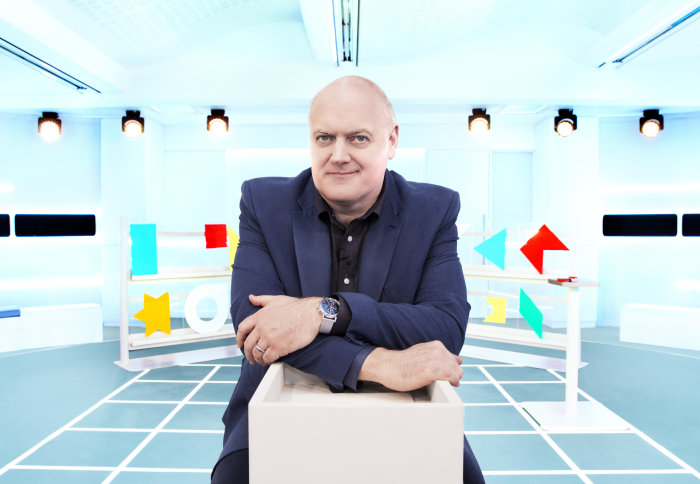Imperial researcher helps design tricky intelligence tasks for new TV gameshow
by Ryan O'Hare

Dara O'Briain, host of the The Family Brain Games on BBC Two, puts families through their paces
An Imperial academic has helped to design fiendishly difficult tasks on a new television show to test different aspects of human intelligence.
Dr Adam Hampshire’s team, from the Department of Medicine, worked with the creators of TV show The Family Brain Games, to help design a series of games for the show, which airs this evening (Monday 17 June) at 8pm on BBC Two.
The quiz pits families against one another to test their intelligence through a series of tricky tasks – covering everything from numeracy and memory to lateral thinking and strategy. At the end of eight episodes, one family will be crowned the brainiest bunch.
As part of the show Dr Hampshire worked with games designers – including David Bodycombe, renowned games designer for The Crystal Maze and The Krypton Factor – to create a set of challenges to measure different aspects of individual intelligence. The games will also explore group intelligence of the families, and how they plan, problem-solve and communicate towards a common goal – beating the other team.


You can remove the blocks. You cannot rotate or slide them sideways. Blocks will fall into different positions if you remove the ones beneath them. (Answer at the end of the article)
Dr Hampshire said: “Intelligence is important, but cognitive neuroscientists now know that it is far more multifaceted than just IQ. It includes our ability to learn, reason and hold information in mind, but also to navigate the world around us and communicate with one another.
"The examples we’ve provided explore a wide range of aspects of human intelligence, so it goes well beyond IQ testing. The concept of intelligence has evolved beyond numeracy and memory to include things like how we process emotions, how we communicate and how we assess risk, as well as other aspects.”

Only one bead can be moved at a time. The beads slide on and off via the ends of the branches. They cannot move past each other on a branch. They must be moved from branch to branch, not placed to the side. (Answer at the end of the article)
In 2017, Dr Hampshire was part of a team which devised an artificial intelligence platform to model human intelligence. The platform, called Cognitron, aims to see if an AI machine can identify the major components of human intelligence – one of the biggest challenges in the field of intelligence.
Cognitron gathers large amounts of data from participants, using this information to build more sophisticated intelligence tests that could have a wide variety of applications.
Dr Hampshire added: “The first stages of the Cognitron study have generated exciting data from thousands of people. The initial results shine a light on the complex nature of intelligence and its relationship to brain function.
"These results are being prepared for publication at the moment. We hope that people will enjoy the television programme and take part in the challenges at home. But beyond this, we encourage members of the public to try out braingames.cognitron.co.uk – it’s a chance to test your intelligence in a fun way while contributing to valuable scientific research.”
Family Brain Games, airs Monday 17 June at 20.00 on BBC Two. The show will run Monday to Thursday until 27 June
To take part in any of the brain games, visit the Cognitron website.
Feature image: Credit - BBC/Label1/RyanMcNamara
Answers:
Task 1: Remove blocks 1, 5, 9, 10, 11
Task 2: See GIF below for solution
Article text (excluding photos or graphics) © Imperial College London.
Photos and graphics subject to third party copyright used with permission or © Imperial College London.
Reporter
Ryan O'Hare
Communications Division